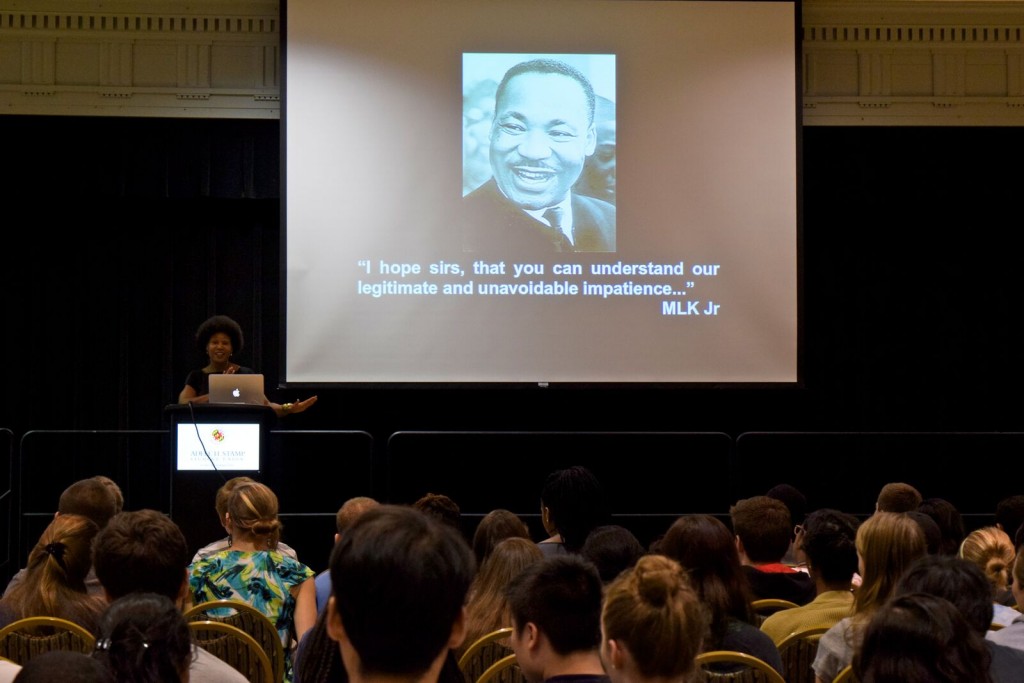
Scholars kicked off the “Trash Talks” lecture series on Wednesday, September 30 with a brilliant lecture by Majora Carter about transforming low-status communities through development strategies that are environmentally friendly and economically innovative.
Carter offered insight from her Sustainable South Bronx project, which revitalized her native New York City neighborhood through a combination of green job training, community greening programs, and social enterprise.
Three students in the College Park Scholars Environment, Technology, and Economy program react to Carter’s message about how communities treated as trash could be transformed through grassroots efforts to create genuine “Home(town) Security.”
With the permission of the students, the three excerpts have been extracted from reflection papers written after the event.
Mechanical engineering major Sophia Relph considers how transit planning effects the economic mobility of community residents – and what else must be done.
Majora Carter mentioned that many people in her hometown of the Bronx work outside of their neighborhood, but that walking miles to work through a crowded city is difficult and potentially dangerous. If someone cannot afford a car and has no access to transit, then this is unfortunately their only option. Transit planning can become impersonal and focus on profitable trunk routes without consideration for its ethical obligation to serve as many as possible in its area.
For disadvantaged areas and people, transit is certainly important, but physical mobility does not mean economic mobility. If we as a nation want to confront the issues of poverty and social inequality and put an end to the violent injustice of capitalism, we need to improve social mobility, lower the cost of basic necessities like housing, medical care, and higher education, and protect the working class and unprivileged people from economic and legal oppression. Social equity is multifaceted, and access to transit is but a single facet of a much more complicated issue.
Nora Alshareef, a civil engineering major with a minor in sustainable studies, explains how experience is essential to understanding and how a trip to Egypt informed her reaction to the talk.
Majora Carter’s lecture introduced a new perspective for many of us. Of course, we all know about urbanization and poorer communities, but many of us don’t have hands-on experience with the littered streets, contaminated water, and the overall dangers of living in these communities. I do. I visited family in Egypt two years ago and witnessed the life of those living in poorer communities. This trip was the most eye-opening experience I have ever had in my life.
Majora Carter showed us pictures of poor communities and told us stories about them, including a very personal one about her brother. Not many people were surprised, considering they have seen these images on television, but they still had a strong sense of disconnect that I no longer had. I have seen the buildings and the environment, but I have also seen the people. I can guarantee that direct experience is a lot more powerful than any PowerPoint could ever explain. It gives you a sense of obligation and responsibility, especially when these people are your people.
Freshman Letters and Sciences student Will Mast compares rural Delmarva to the South Bronx and wonders how he can help transform his childhood home.
In the life of an individual, the limitations of their community are often the difference between staying where they grew up, and leaving to pursue better opportunities. We all want to see our homes as good places to live, and when they aren’t, it presents us with a difficult decision.
Although the Delmarva Peninsula is a rural agrarian area and not an urban ghetto, it shares a lot of the push factors that cause progressive folk to decide to start their lives in other areas. We suffer from a severe lack of pedestrian friendly environments and job opportunities that have potential for progression. For an ambitious college graduate, there is very little to look forward to, and many decide to leave rather than adapt.
I love the shore. From the briars that carpet the thick Pocomoke pine forests to the Seagulls that steal your French fries on the Ocean City boardwalk, I know my community, and for better or worse it will always be my home. I would love to see it become a place where the growth of social capital is approached as a serious investment with specific goals in mind.
I thought Ms. Carter’s community revitalization strategy was brilliant – take existing areas and the elements of them that people want to love, and make them lovable. We can create areas that attract people of all economic statuses, knowing that their interaction is the foundation for community. We can create healthy environments for our bodies and our minds. Our industries can be both capitally aggressive and environmentally progressive. A revitalization process for the shore would look very different from Ms. Carter’s, but I believe that my home deserves the same love and effort from me that she has put into hers.